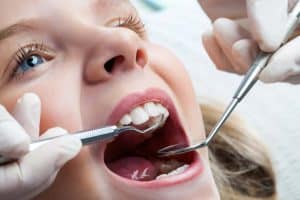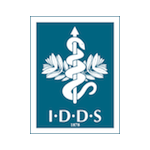At a routine dental visit, a dental hygienist will examine your teeth for any problems, including cavities or gym disease. During this examination, they will also clean your teeth using professional equipment (which gives you a much more thorough cleaning than just brushing and flossing can ever provide). These routine cleanings are recommended every 6 months and are important to help you maintain good oral health.
During the cleaning, the hygienist will scrape off any built-up plaque and tartar that collect on your teeth and around your gum line. They will also polish your teeth to remove anything that was missed in the scraping and to help keep your teeth smooth, so plaque does not collect as easily. The hygienist and dentist will also give you an oral cancer screening to check for any changes in the soft tissue of your mouth and check for any jaw abnormalities that may be causing issues.
If you have dental insurance, most insurance companies will cover the cost of a check-up and cleaning once or twice a year (please check with your insurance company). If you do not have dental insurance, a visit will cost you (on average) $130 – $175. The cost of exams and cleanings are calculated by the amount of equipment and materials needed to perform a cleaning an exam, as well as the time the hygienist and dentist spend working and caring for your teeth. If it is discovered that your x-rays are out of date, or you have a problem that requires an x-ray, please remember that this is an additional cost (which may or may not be covered by your dental insurance).
Some people may try to save money by avoiding the dentist altogether. This is definitely not recommended as it is much easier to maintain good oral health or fix a small problem, than put off maintenance and have a much larger problem (like a crown, implant, etc.) down the road. Think of it as performing maintenance on a large purchase such as a car. Would you go years without an oil change and then just hope for the best? By avoiding regular dentist visits, you are setting yourself up for future oral health problems that can be costly.








